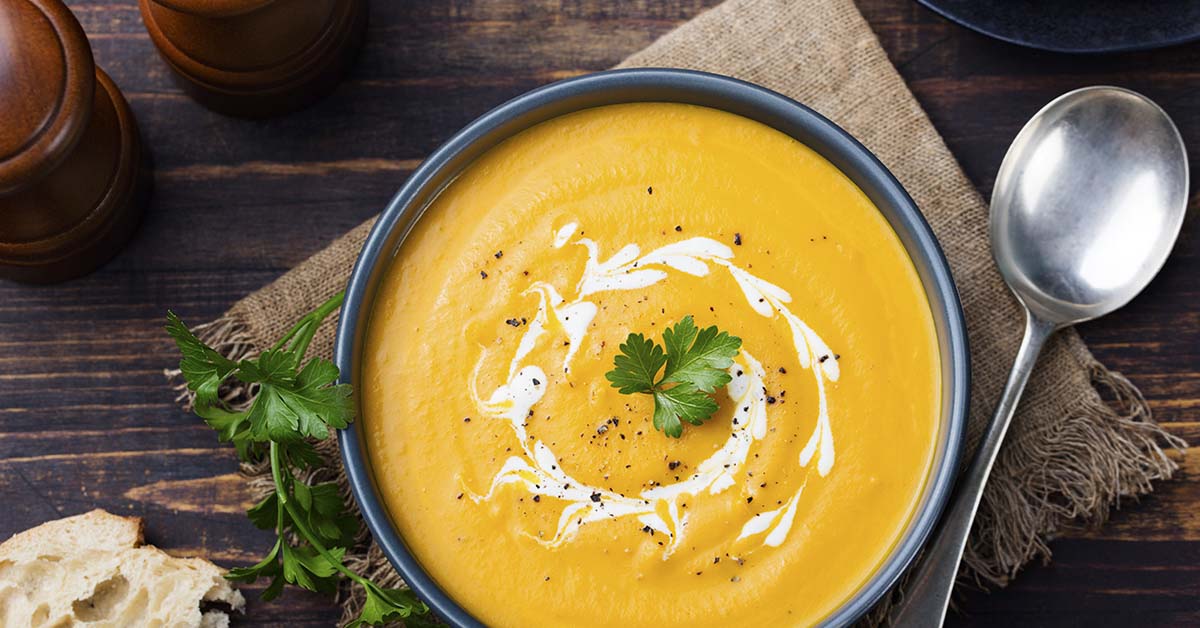Soup is the perfect winter food after a long day in the cold. This recipe is full of bursting flavors like ginger, turmeric, and fennel, and it’s also rich in health benefits. These ingredients, along with the carrots, butternut squash, leek, and garlic, contain antioxidants and anti-inflammatory properties that help to support general health. This soup recipe is also vegan and suitable for those with intolerances to gluten and dairy.
Anti-Inflammatory Ginger and Turmeric Carrot Soup
Ingredients
- 1 tbsp olive oil
- 1 leek, cleaned and sliced
- 3 cups chopped carrots
- 1 cup chopped fennel (about 1 small head)
- 1 cup chopped butternut squash
- 2 garlic cloves, minced
- 1 tbsp grated ginger
- 1 tbsp turmeric powder
- Salt & pepper to taste
- 3 cups low-sodium vegetable broth
- 1 can coconut milk (14.5 ounces, light is better than whole fat)
Instructions
- Heat the olive oil in a pot. Add the leek, carrots, fennel, and butternut squash. Sauté for 3–5 minutes until the vegetables begin to soften. Add the garlic, ginger, turmeric, salt, and pepper. Sauté for a few more minutes for all the flavors to blend together.
- Add the broth and coconut milk. Then bring the soup to a boil, cover, and simmer for about 20 minutes.
- When the soup is cooked, mix it with an immersion blender or regular blender until it’s smooth. Adjust the seasonings to your taste.
- Serve and enjoy!
- Afterward, store in an airtight container in the refrigerator for up to 5 days, or store in the freezer for up to 6 months.
Recipe by Alyssa Rimmer. For more tips and tricks for this recipe, check out the Simply Quinoa blog.
The health benefits in the ingredients
Butternut squash and carrots
These two vegetables are rich in beta-carotene, an antioxidant with anti-inflammatory qualities that could help the body fight against diseases. Some studies indicate that these properties can help ward off cardiovascular issues, some kinds of cancer, and other diseases.
“Diets rich in antioxidants like beta-carotene may help enhance our natural immune response and reduce the incidence of certain types of cancer, due to their tendency to reduce cell oxidation,” says Volpe. However, although antioxidants can help prevent free radical damage that can lead to cancer, experts do not consider them a primary method to prevent cancer. [1]
Ginger
Ginger is known for its medicinal properties. Perhaps its most common use is to relieve nausea and morning sickness. In its raw form, ginger contains a large amount of gingerol, a bioactive compound that has properties to fight against certain kinds of cancer, although more research is needed to explore this potential. Moreover, ginger’s antioxidants can help reduce oxidative stress and inflammation; animal studies show these qualities may help improve age-related cognitive decline. [2]
Read: 9 Satisfying Mushroom Soup Recipes To Keep You Warm All Winter
Leeks
Leeks are rich in flavonoids, a group of antioxidants with several health benefits, including potential anti-inflammatory properties. They also contain vitamin K, which can help improve bone density, which may reduce the risk of osteoporosis. In addition, they have vitamin C, vitamin B6, iron, folate, manganese, and copper. [3]
Fennel
Fennel is unique for its licorice-like flavor, so it’s a common ingredient in tea. The main fennel bulb contains magnesium, potassium, calcium, phosphorus, and essential fatty acids. Additionally, research has shown that fennel seeds may have antioxidants, anti-inflammatory, and anti-fungal effects. Fennel also contains selenium, a mineral that doesn’t appear in many other foods. Selenium can help prevent inflammation and decrease certain cancer-causing compounds in the body. It could also help improve immune response to viruses. [4]
Garlic
“Garlic gets its pungent smell from an organic sulfur compound called allicin,” says dietitian Laura Jeffers, MEd, RD, LD. “This compound also makes garlic a healthy addition to your diet.” And soup is an easy way to consume it.
Furthermore, garlic could help improve immunity, and garlic oil can be an effective anti-inflammatory. The antioxidants in garlic can help protect against cell damage and aging. “You’ll get the most benefit from raw garlic,” says Jeffers. “But if you choose to cook it, don’t heat it above 140 degrees Fahrenheit (60 degrees Celsius). Higher temperatures kill the allicin, so add garlic to your recipes when you’re almost done cooking.”[5]
Turmeric
Turmeric is a famous superfood filled with nutritional benefits. Its active ingredient is the compound curcumin, which has antioxidants and anti-inflammatory qualities. “Curcumin has many biological activities, not all of which are understood,” says Mary-Eve Brown, an oncology clinical dietitian/nutritionist at Johns Hopkins Medicine. “Like other colorful plant-based foods, turmeric is rich in phytonutrients that may protect the body by neutralizing free radicals (pollution, sunlight) and shielding the cells from damage. Anyone who’s trying to manage inflammation could benefit from adding some turmeric to their foods.” [6]
Keep Reading: How To Make Amazing Naturally Flavored Water
Sources
- “7 Potential Health Benefits of Butternut Squash.” Every Day Health. Lacey Muinos. December 29, 2022
- “11 Proven Health Benefits of Ginger.” Healthline. Joe Leech, MS. March 19, 2021
- “Health Benefits of Leeks.” WebMD. Poonam Sachdev. September 9, 2022
- “Is fennel good for you? Health benefits, nutrition, and more.” Medical News Today. Megan Ware, RDN, L.D. January 7, 2022
- “The Health Benefits of Garlic.” Cleveland Clinic. March 2, 2022
- “Turmeric Benefits.” Johns Hopkins Medicine. Mary-Eve Brown, R.D.N., C.S.O., L.D.N.

